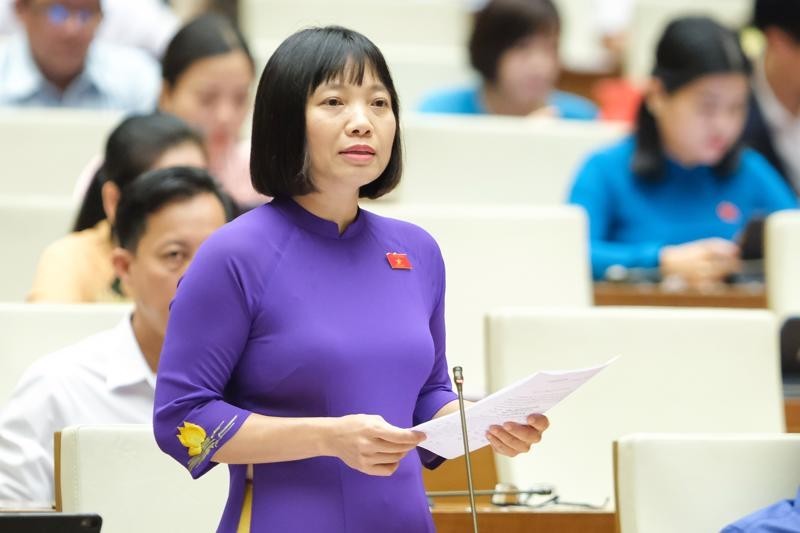
NA Deputy: Default housework as women work preventing gender equality entering reality
Latest
 |
| National Assembly (NA) Deputy Nguyen Thi Viet Nga, Member of the National Assembly's Committee on Culture and Education. (Photo: WVR) |
Although Vietnam has made many efforts in eliminating gender inequality, Deputy Nga expressed her views that the issue of gender equality still has many difficulties and challenges.
Vietnam is considered by the world as one of the fastest countries to narrow the gender gap in the past 25 years. One of the special features of eliminating gender stereotypes in Vietnam is the completion of legal framework and policies on gender equality.
In her opinion, the difficulties and challenges in the issue of gender equality in Vietnam today is the fact that the gender gap still exists quite large in many areas of social life. Although there is a lot of improvement, women's participation in politics is still very limited. The percentage of women in leadership and management positions is still very low in comparision with the leadership and management positions in general and the annual increase of female workforce.
In the economic field, women's access to high-income jobs is less than that of men. Health care services for women have not been improved much, especially in rural and mountainous areas.
Women and girls, in the most cases, are still the main victims of domestic violence. Women are less likely to be shared with housework and most of the unpaid service work is left to women.
At the same time, awareness of gender equality is still vague, even women sometimes don’t have access to proper documents on gender equality. All of these practices are significant challenges in the process of implementing gender equality in Vietnam.
Regardless of difficulties and challenges, Ms. Nga has reaffirmed Vietnam’s achievements in narrowing the gender gap.
She stressed that over the past 25-30 years, Vietnam’s achievements in narrowing the gender gap are very important and proud-worthy. Vietnam has developed and promulgated legal documents demonstrating the principles of gender equality and non-discrimination in accordance with the Law on Gender Equality and the United Nations Convention on the Elimination of All Forms of Discrimination against Women, maintaining gender equality in law-making process and enforcement.
Vietnam also promulgated the National Strategy on Gender Equality for the period 2011-2020 with the aim of raising awareness, narrowing the gender gap and enhancing the status of women.
Moreover, the Government has actively implemented many solutions in law enforcement and carried out international cooperation to overcome challenges related to awareness of gender equality, elimination of gender stereotypes and domestic violence. Vietnam is also a country with a high percentage of women participating in the National Assembly compared to other countries in the region and the world at large.
 |
| According to Deputy Nguyen Thi Viet Nga, modern women in the 4.0 era need a modern concept, first of all, on gender equality. (Photo: WVR/Hung Thoa) |
Among 499 members of the 15th National Assembly, 151 deputies are female, accounting for 30.26%. Females are participating in many industries and fields. Clearly, these are significant achievements in narrowing the gender gap. Even the old-rooted concept to consider having a son is much worth than having ten daughters has changed a lot. Young parents today are paying more attention to raising children than choosing child gender.
Concering the mainstreaming gender equality into social security policies, Deputy Nga made certain practical remarks.
The first thing is the social insurance. Vietnam has paid great attention to shortening the compulsory social insurance payment period for women compared to men due to gender specificities, improving the maternity leave, sick leave for women, giving affirmative regime for women raising children under 36 month old.
However, the maternity regime has not fully covered women of childbearing age because there is still a large female labor force living in rural areas and working in the informal labor sector, which is not the subject to this humanitarian policy. This reality has greatly affected the health of mothers and children, affecting the sustainable human resources of the country.
There are not many welfare policies designed specifically for women. Vietnam is still lacking in specialized health care services for women and girls. That requires having comprehensive solutions to integrate gender equality into social security programs.
In order to make the solid foundation for realizing national gender equality goals in the coming times, Deputy Nga thinks that changing social perception is the most important.
In recent years, the international community has highly appreciated Vietnam's efforts in realizing gender equality. However, there are still many difficulties and challenges because the biggest barrier is the social awareness of this issue. As long as there are not correct, scientific and progressive perceptions of gender equality, Vietnam will still be struggling in the process of implementation.
Vietnam as well as many Asian countries are still deeply influenced by feudal ideology in favoring men and disrespecting women. Therefore, changing people's perceptions which are deeply ingrained in the subconscious personality, even imprinted in customs, practices and cultural traditions, can not happen in a day or two.
On the other hand, Vietnam is a country with many ethnic groups living together, each ethnic group has its own customs and habits, so it takes a lot of effort to achieve the common goal of gender equality. The smallest things in the family, with an default that mother and wife are people taking care of all members and the housework is accustomed woman's work, made gender equality completely non substantive.
Even women themselves are sometimes contented with gender inequality, which creates "inertia" that makes narrowing the gender gap many barriers.
For women’s attitude in the digital age, Deputy Nga hold the views that there is still a very wrong perception of gender equality that women have the right to do everything men do and women don't need to maintain traditional virtues. According to her, it is only an illusional concept going against tradition and not for gender equality. In fact, gender equality does not mean turning all women into men.
Women have specific psycho-physiological characteristics and special duties, so they cannot claim them to be "like men" in all respects. Gender equality is meant non-discrimination on the basis of gender stereotypes, men and women are given equal opportunities in the development process.
Modern women in the 4.0 era need a modern concept, first of all, on gender equality. Modern woman must be an independent, self-reliant and confident, a person who always has the will to rise up but also does not forget her noble mission of motherhood.
*Since the establishment of ASEAN, on August 8, 1967, ASEAN women have made very positive contributions to the growth and prosperity of the member countries. The proportion of women in Parliaments in many ASEAN countries has reached over 20%. The number of women who own businesses has increased significantly recently and many women are chairwomen of the Board of Directors or CEOs of large corporations and businesses.
According to a report by the United Nations Agency for Gender Equality and Empowerment of Women (UNWomen), the ASEAN economy has grown at an annual rate of 5% over the past decade and is expected to grow by another 30% in the next decade, but women have contributed only 11% of ASEAN's total export values. Therefore, ASEAN countries need to act together and have effective solutions to improve the position of women in the new era.
Women in ASEAN countries have had many activities to enhance their roles and positions as well as their womenhood solidarity. In 2015, the ASEAN Community Women's Group in Hanoi was established with the participation of ASEAN diplomats’spouses and female diplomats of the Ministry of Foreign Affairs of Vietnam and other ASEAN Representative Missions in Hanoi. The group is a bridge of friendship and cooperation among Vietnamese women and women from ASEAN countries, among ASEAN and international friends, creating opportunities for women in the region to share information, knowledge and experiences, promote gender equality and enhance the role of women in diplomacy.

















